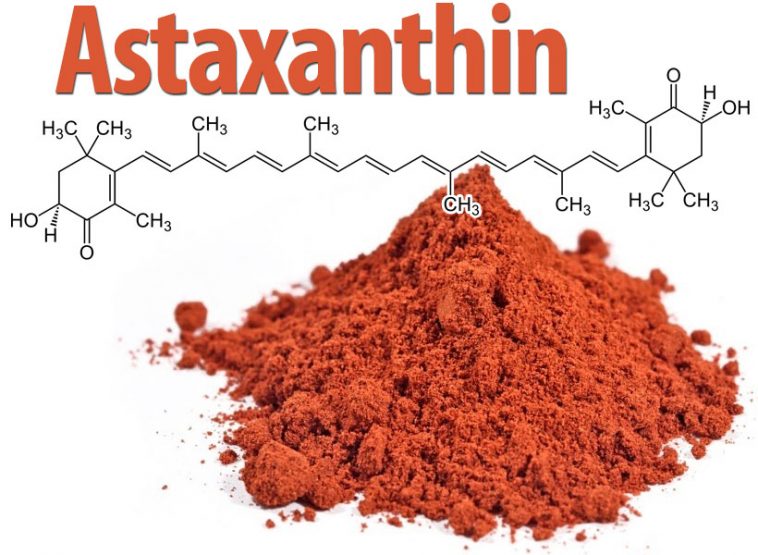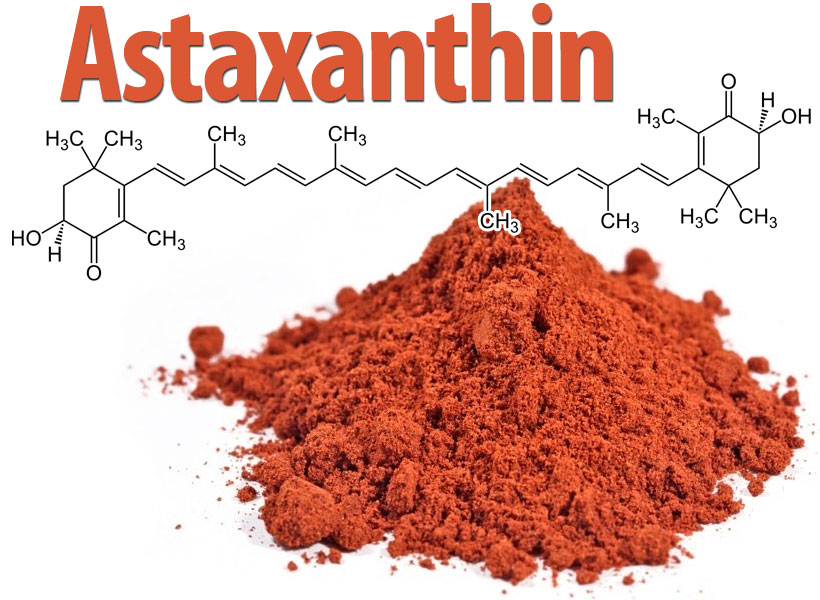- Like
- SHARE
- Digg
- Del
- Tumblr
- VKontakte
- Flattr
- Buffer
- Love This
- Save
- Odnoklassniki
- Meneame
- Blogger
- Amazon
- Yahoo Mail
- Gmail
- AOL
- Newsvine
- HackerNews
- Evernote
- MySpace
- Mail.ru
- Viadeo
- Line
- Comments
- Yummly
- SMS
- Viber
- Telegram
- JOIN
- Skype
- Facebook Messenger
- Kakao
- LiveJournal
- Yammer
- Edgar
- Fintel
- Mix
- Instapaper
- Copy Link
 What is Astaxanthin?
What is Astaxanthin?
Astaxanthin (pronounced “asta-ZAN-thin”) is a naturally occurring carotenoid that comes from two primary sources: microalgae and sea creatures that consume microalgae. Astaxanthin is the substance that gives species their unique red-pinkish colour (such as shrimp, salmon, flamingos etc). This carotenoid is a powerful antioxidant and an anti-inflammatory compound which means it has many health benefits (discussed below).
What are Carotenoids?
Carotenoids are a group of plant pigments found in many plants, algae, and bacteria. They are distinguished by their orange, yellow, and red pigments. Carotenoids act as antioxidants within the body as they protect the body against cellular damage and several chronic diseases.
Carotenoids are split into two classes: carotenes (do not contain oxygen) and xanthophylls (contain oxygen). Astaxanthin falls under the xanthophyll category in which beta-carotene, lycopene, lutein, and zeaxanthin also fall under this same category.
Astaxanthins are the “king” of carotenoids which means that it is one of the most beneficial carotenoids. They are one of the few carotenoids that have been studied at length with regards to human health. Beta-carotene is another very beneficial carotenoid that is found mostly in carrots, however, astaxanthin is 50 times more powerful and beneficial than beta-carotene.
Where does Astaxanthin come from?
Natural astaxanthin is produced naturally in microalgae, fungi, and bacteria, and the aquatic creatures that eat algae. Some of the common naturally occuring sources of astaxanthin include sockeye salmon, red trout, lobster, shrimp, crab, krill etc.
The problem is that these sources only contain limited amounts of astaxanthin so a dietary supplement is beneficial for individuals looking to incorporate more astaxanthin into their diet.
How to take Astaxanthin
Astaxanthin is not produced by humans therefore it must be ingested via the foods we eat or with supplements. On average, experts recommend 4 to 12 mg of astaxanthin per day in order to get the most benefits out of it. However, this can vary from person to person depending on the health condition of the individual.
Astaxanthin is a fat-soluble molecule. As a result, in order to increase its absorption, it should be consumed with a meal that is high in healthy fats, such as fatty fish, avocado or olive oil.
Should Astaxanthin be incorporated in the health and wellness industry?
Absolutely. Astaxanthin is a powerful antioxidant AND an anti-inflammatory compound. It is a newer compound whose amazing benefits have recently been researched. It is 1000 times more powerful than Vitamin C, making it an amazing compound to include in your diet.
Benefits of Astaxanthin
Below are some of the many benefits of astaxanthin…
#1. Improves Heart Health
This antioxidant rich compound helps to maintain normal blood levels, LDL, HDL, and triglyceride levels. Astaxanthin helps keep blood fat levels at a normal range by improving blood flow and reducing fatty acids in the blood.
#2. Reduces Inflammation
Astaxanthin has major anti-inflammatory properties and is known to inhibit the activity of inflammation-causing compounds. Since astaxanthin can travel throughout the body, it can target high-stress areas, such as the heart and brain. High levels of inflammation in the body is known to fuel conditions such as heart disease and Alzheimer’s disease which can be prevented by consuming astaxanthin.
#3. Reduces Oxidative Stress
Oxidative stress is an imbalance in the body if there are not enough antioxidants available. Adequate levels of antioxidants are needed to prevent stress and inflammation in the body and astaxanthin can be a great supplement to help prevent it. Furthermore, astaxanthin is shown to lower oxidative stress in obese individuals and smokers.
#4. Promotes Healthy Skin
Oral doses of astaxanthin can help smooth wrinkles and retain moisture on the skin. Studies have found that a diet rich in astaxanthin improves fine lines, wrinkles, elasticity and dryness.
#5. Lowers Risk for Diabetes
Astaxanthin lowers high blood sugar levels and oxidative stress which are common indicators of diabetes. It can improve sugar metabolism in the body to help prevent the risk for diabetes.
#6. Neutralizes Free radicals
Free radicals are toxic byproducts that can cause cancer and damage cells. One way to get rid of free radicals in the body is by eating foods that are high in antioxidants. Since astaxanthin is an antioxidant-rich compound, it can get rid of free radicals in the body by “neutralizing” them.
#7. Improves Eye Vision
Astaxanthin protects the eyes from light-induced damage. Astaxanthin helps to prevent the most common eye diseases, such as age-related macular degeneration (AMD), glaucoma and eye strain. The human eye has molecules that are closely related to astaxanthin. Studies have shown that 6 mg per day of astaxanthin can help reduce eye dryness, tiredness, and blurred vision.
#8. Protects the Brain and the Nervous System
Astaxanthin has a proven impact on the brain. It has the potential of slowing cognitive decline from brain aging, protects the brain cells from damage from various toxins, and improves brain blood flow and memory. A study on human cells found that astaxanthin reduced brain cell death by lowering the oxidative stress that is brought to the brain.
#9. Promotes Joint Health
Due to its anti-inflammatory properties, astaxanthin can reduce inflammation and pain symptoms related to arthritis. It slows down the damage that free radicals can cause to the joints by preventing free radical damage.
#10. Improves Muscle Performance
Astaxanthin can affect endurance. Studies on mice show that astaxanthin can promote the use of fatty acids in the body, which helps endurance, and prevents muscle and skeletal damage.
The Bottom Line
Overall, consuming healthy levels of astaxanthin helps support a healthy body with its anti-inflammatory and antioxidant properties. Make sure to incorporate astaxanthin into your diet to benefit from its incredible properties.
Author Bio:
Codrin Arsene is the CEO of Digital Authority Partners, a digital marketing agency in Chicago, Il.
About Jason Spencer
Jason Spencer has a tremendous enthusiasm for all facets of health, fitness and physical performance that stems from an athletic lifestyle from childhood. Jason was fortunate enough to compete in collegiate football and learned to love the challenges that physical activity placed on the body. As Jason progressed through his higher education and became increasingly aware of how science is applied to physical activity and how it reveals the benefits of exercise, he realized very quickly that he wanted to pursue a career that gives him the opportunity to teach others to compete, challenge, and push themselves towards something more valuable to them than anything else; health, fitness and self worth. Being a fitness professional allows Jason to do this for them and he is always incredibly grateful for that. Jason has a Bachelor of Science degree in Neuroscience from Muhlenberg College in Allentown, PA. Neuroscience and his acquired knowledge of the nervous system and muscle stimulation techniques has been extremely instrumental towards building a unique ability and feel for training the body for optimal form and function. As a personal trainer he is certified with ACSM (American College of Sports Medicine). He's also a strength & conditioning specialist with NSCA (National Strength & Conditioning Association). He has additional certifications in both kettlebell principles & techniques (Equinox), and Flexibility & Corrective Exercise (Swedish Institute of Health Sciences in NY). Jason has worked as a trainer and conditioning specialist in a variety of fitness facilities over the years such as: LA Fitness in Piscataway, NJ, the YMCA in Metuchen, NJ, and Equinox Fitness Clubs in New York, NY. He also does private in-home sessions all over the Manhattan area.


 What is Astaxanthin?
What is Astaxanthin?